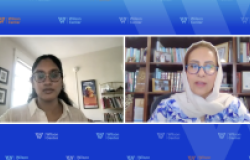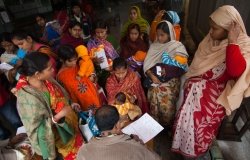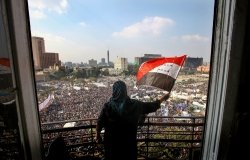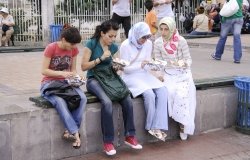Book Talk | Egyptian Made: Women, Work, and the Promise of Liberation with Leslie T. Chang
Overview
The Middle East Program (MEP)’s Middle East Women's initiative was pleased to host former Wall Street Journal journalist Leslie T. Chang for a discussion about her new book, Egyptian Made: Women, Work, and the Promise of Liberation. Visiting Professor Loubna Skalli Hanna at California University at the Washington Center joined the conversation as a discussant and Faria Nasruddin, Associate, Middle East Program, Wilson Center, served as the moderator.
Chang relocated to Egypt in 2010 after spending nearly two decades reporting on China with The Wall Street Journal. Based on her reporting in China, Chang wrote Factory Girls: From Village to City in a Changing China, in which she follows young women working in factories in Dongguan, an industrial city in China’s Pearl River Delta, and covers topics such as migration, work, and gender. She once again visits these themes in her latest book, where she selected three women employed in low-skilled, labor-intensive manufacturing and tracked their progress for over two years. Her findings revealed how these women could transform their identities and social standing through employment—as well as its limitations.
Hanna noted that Chang had a “search for China in Egypt,” despite the countries differing gendered and economic contexts. In China, nearly 60% of adult women participate in the workforce, where this figure stands at just 20% in Egypt. In Egypt, Chang found that women played a significant role supporting their families but that they were not reaping the benefits of greater autonomy—a sharp contrast from the landscape in China.
In her response, Hanna emphasizes that the narratives about women in Chang’s book are not just profoundly personal but that they are intertwined with broader historical narratives, reflecting the history of female labor over many decades in Egypt. They encompass various struggles, including the country’s industrialization challenges and cotton production. She underscored that the book illustrates how a culturalist explanation for the low female labor participation rate in Egypt is insufficient, as is the sole emphasis on authoritarianism. Instead, it argues that a combination of factors, including but not limited to these two, shapes female contributions to the market. This includes significant distinctions between urban and rural contexts.
Hanna further warned that economic reform in Egypt often employs “buzzwords,” like inclusive growth, gender budgeting, equality, and empowerment. However, these terms can become trivialized and lead to outcomes that exacerbate, rather than enhance, women’s economic participation. She criticizes what she calls “economic stupidity” for failing to capitalize on the economic potential that Chang identifies on the factory floors in Egypt, stressing the importance of synergizing top-down and bottom-up policies to increase female labor participation.
Speakers
Introduction
Hosted By

Middle East Program
The Wilson Center’s Middle East Program serves as a crucial resource for the policymaking community and beyond, providing analyses and research that helps inform US foreign policymaking, stimulates public debate, and expands knowledge about issues in the wider Middle East and North Africa (MENA) region. Read more

Middle East Women's Initiative
The Middle East Women's Initiative (MEWI) promotes the empowerment of women in the region through an open and inclusive dialogue with women leaders from the Middle East and continuous research. Read more
Thank you for your interest in this event. Please send any feedback or questions to our Events staff.













